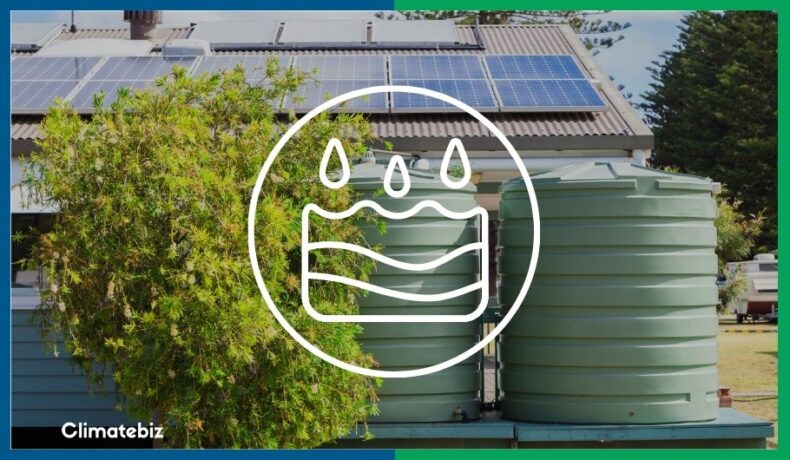“Is it legal to collect rainwater?”
You may know a fair bit about rainwater collection, but are you familiar with the legalities surrounding its harvesting?
It can be very frustrating and time-consuming to search through the laws and regulations of each state. This is especially true when you’re searching for rainwater regulations that are so specific.
Luckily, we’ve rolled our sleeves up and done the dirty work so that you don’t have to!
This article simplifies the laws and regulations and supplies resources relating to rainwater collection systems.
Table of Contents
Is It Illegal To Collect Rainwater?
Yes, you can legally collect rainwater; no federal laws prohibit rainwater collection. The Federal Energy Management Program and the National Agricultural Law Center clarify this.
However, each state has its own rainwater harvesting regulations.
Some states limit the amount of water you can collect, while others offer incentives. That said, none of them prohibits the collection of rainwater.
The following map indicates the level of rules and regulations in place per state:
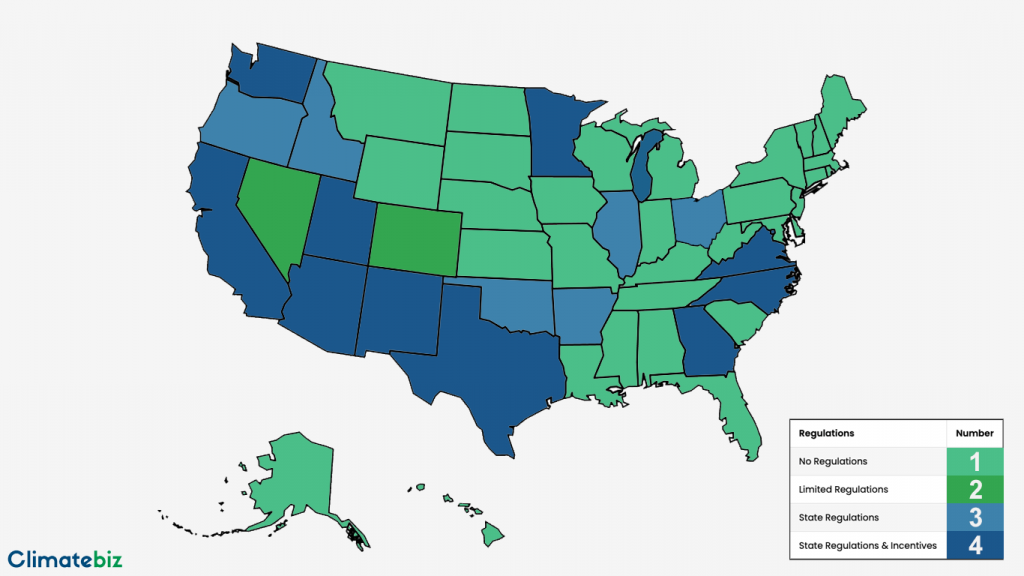
| Regulations | Number |
| No Regulations | 1 |
| Limited Regulations | 2 |
| State Regulations | 3 |
| State Regulations & Incentives | 4 |
What Are The Laws Governing Rainwater Collection?
Most laws stipulate how much rainwater you can collect and who can manage it. Additionally, some states highlight if you’re allowed to drink the rainwater or not.
We’ve broken down the different laws and regulations into four levels to make things easier.
- No Regulations: after searching through governmental sites, we’ve not found any information relating to rainwater collection.
- Limited Regulations: in this category it’s legal to collect rainwater but the regulations are limited. This just means that there are few rules you need to follow.
- State Regulations: there are some regulations that the state has put in place. We’ve outlined these regulations for you.
- State Regulations & Incentives: not only are there regulations set out, but the state also offers incentives.
No Regulations
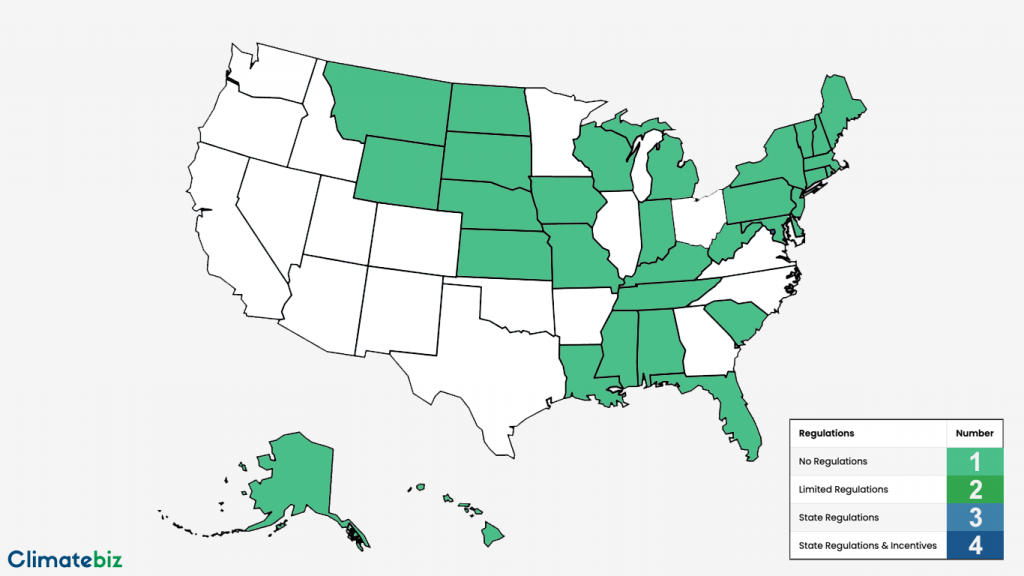
We couldn’t find any laws or regulations for the following states. However, collecting rainwater is still legal; it’s just not regulated.
| State | Additional Resources |
| Alabama | Rainwater Harvesting in Alabama |
| Alaska | None Found |
| Connecticut | Connecticut Stormwater Quality Manual |
| Delaware | University of Delaware |
| Florida | Florida Water Star |
| Hawaii | You can find resources here and here. |
| Indiana | None Found |
| Iowa | Iowa Stormwater |
| Kansas | None Found |
| Kentucky | None Found |
| Louisiana | None Found |
| Maine | None Found |
| Maryland | Maryland Green Registry |
| Massachusetts | Bill H.2632 |
| Michigan | None Found |
| Mississippi | Mississippi State University |
| Missouri | You can find resources here and here. |
| Montana | Montant.gov |
| Nebraska | Drought Resources |
| New Hampshire | None Found |
| New Jersey | None Found |
| New York | Rainwater Harvesting Guide |
| North Dakota | None Found |
| Pennsylvania | PennState Rainwater Cisterns |
| Rhode Island | University of Rhode Island |
| South Carolina | None Found |
| South Dakota | None Found |
| Tennessee | Permanent Rainwater – Rainwater Harvesting |
| West Virginia | West Virginia Department of Environmental Protection |
| Wisconsin | None Found |
| Wyoming | None Found |
Limited Regulations
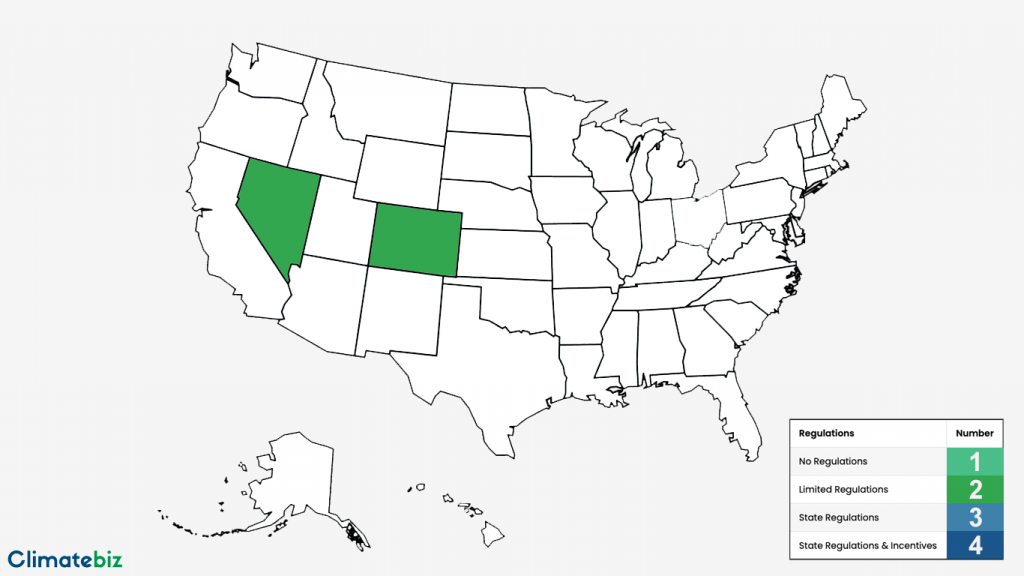
Nevada
Residents in Nevada can collect rainwater from their homes, but only for non-potable domestic use. They can also use water as a guzzler for wildlife.
To find out more about these regulations, you can refer to NRS 533.027 – Applicability of chapter to de minimus collection of precipitation.
Colorado
Colorado only allows homes with four persons or less to collect rainwater.
The tanks can only contain a maximum of110 gallons, and the water can only be used for irrigation.
However, if your property has a well, you’re allowed to collect as much rainwater as you like. The only catch is that the rainwater can only be collected off your roof and used to recharge the well.
Thus, you’re allowed to use the rainwater for indoor and outdoor use through your well system. Refer to law HB16-1005.
State Regulations
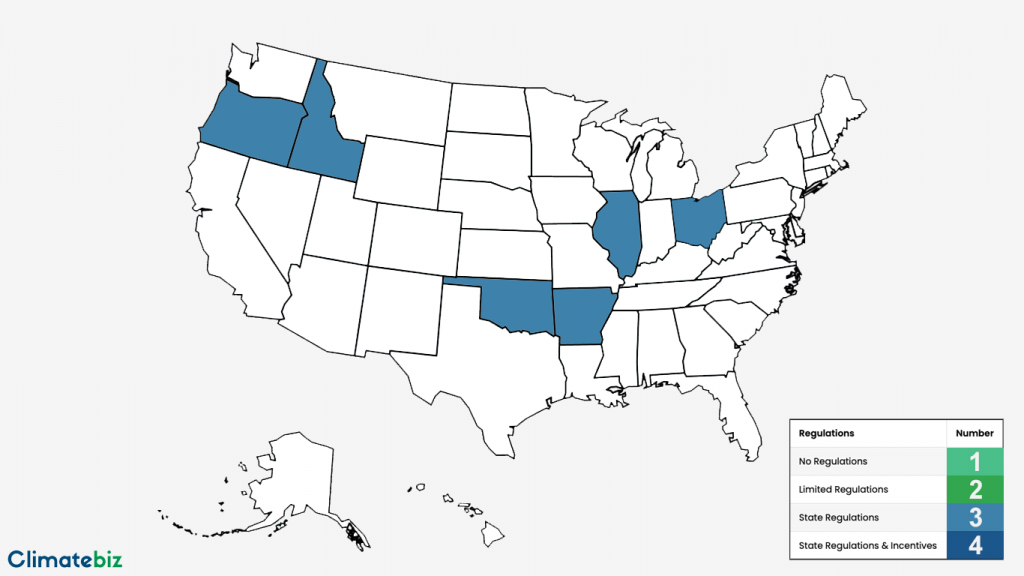
The following states have clear regulations on rainwater collection:
- Oregon: the collection of rainwater is regulated through the Oregon Plumbing Speciality Code. According to chapter 16, it’s legal to collect rainwater for your home as long as the system is placed outside. Pay careful attention to whether you need a permit or not.
- Idaho: the Department of Water Resources states that it’s legal to collect rainwater in Idaho. However, your system is not allowed to infringe on anyone else’s water rights. You can refer to this letter from the office of the attorney general.
- Oklahoma: the state of Oklahoma lacks concrete except for the Water for 2060 Act.
- Arkansas: the state allows the collection of rainwater as long as it meets three requirements; the system needs to be designed by a professional, have the correct safeguards and adhere to the plumbing code. Refer to the AR Code § 17-38-201 (2017), part G for more information.
- Illinois: in 2012 the state of Illinois amended the plumbing license Law to include rainwater harvesting. You can refer to this bill status for a synopsis of the amendment.
- Ohio: the regulations are put in place by the Department of Health and the EPA. Regulations include the amount of water you can collect and the materials you can use. You can refer to Ohio’s EPA homepage and the EPA.
State Regulations And Incentives
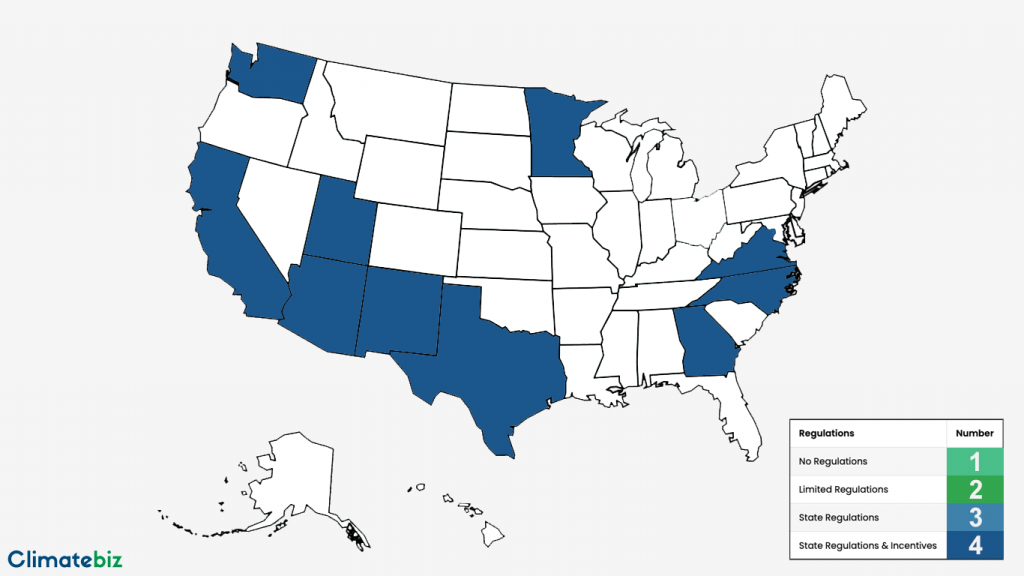
The following states have regulations and possible incentives for collecting rainwater:
Arizona
Rainwater harvesting is encouraged and regulated through the Department of Water Resources.
House Bill 2830 lays out the regulations for the use of rainwater in residential settings. However, it refers to rainwater use in landscapes — we couldn’t find any rules for indoor use.
Arizona doesn’t offer state-wide incentives. However, county and city incentives are available.
California
Rainwater collection is legal in California; it’s regulated through the Division of Water Rights.
There are rules that your system needs to adhere to:
- You don’t need a water permit as long as your system is installed by a qualified landscaper — this is only applicable for outdoor water usage.
- You may need a water rights permit to use rainwater indoors as well as other professionals.
Here are the regulations: Rainwater Capture Act of 2012 [10570 – 10574]
There are no state-wide incentives, but some local county incentives are in place. For example, Santa Monica offers a rebate of $2,000 for two cisterns greater than 500 gallons. In addition, San Diego provides a rain barrel rebate of 50c per gallon.
Georgia
The Department of Natural Resources closely monitors rainwater usage in Georgia.
You should always check with your county on any laws and regulations regarding rainwater collection. You’ll also have to check if you need a permit or not.
You can find all the regulations in Georgia’s plumbing code.
- The code states that you can only use rainwater for outdoor use.
- If you’d like an advanced system, you’d have to install the elements outlined in the code.
Taxpayers can receive up to 25% back on tax when purchasing and installing a rainwater collection system. To obtain the credit, you should contact the Department of Natural Resources.
Minnesota
The state of Minnesota has laid out multiple regulations for the use of rainwater and system maintenance. You can find these regulations in Chapter 4714 of the Plumbing Code.
In summary, the regulations are:
- Designs for rainwater systems need to be approved by a qualified qualified Minnesota engineer.
- Rainwater systems need to be for non-potable water uses such as toilet cisterns, gardening or washing machines.
- Rainwater systems need to be maintained and checked according to this table.
However, it’s unclear whether you need a permit or not for rainwater systems.
North Carolina
Rainwater collection is allowed through the plumbing code of North Carolina and regulated by the Department of Environment and Natural Resources.
Some of the regulations include:
- Rainwater can only be used for non-potable uses.
- All rainwater supply pipes should be purple.
- Rainwater cisterns need to be market with signs stating that the water is non-potable.
For more information, you can refer to this guide for N.C. homeowners.
New Mexico
New Mexico encourages the preservation of water as well as rain collection systems. The Office of the State Engineer (O.S.E.) regulates these laws.
The following rules apply:
- You may collect rainwater as long as it’s used on site.
- The rainwater cannot be used for any purposes other than outdoor use or domestic indoor use.
- The system cannot impact the amount of stormwater runoff from the site.
Check with your local O.S.E. to find out if you need a permit and local incentives.
Texas
Texas is one of the most receptive states to rainwater collection. Not only is it legal and no permit is required, but there are tons of incentives.
- Homes with approved rainwater systems can be exempted of part or all of their county property tax. (Texas Tax Code §11.32)
- There is no tax on rain collection related products such as rain barrels. (Texas Tax Code 151.355)
- Homeowner Associations are prevented from banning rainwater collection systems. (Texas Property Code 202.007)
Utah
The Water Rights Division lays out the regulations for Utah. Here are the following regulations that are currently in effect:
- The rainwater collected should be used on the same land it was collected on.
- You are limited to 2,500 gallons of storage volume.
Remember: you may need to register your rainwater harvesting system. For example, if your system has two containers or one container greater than 100 gallons, you’ll have to register it. Thankfully, registration is free.
Virginia
State legislation sets the rules and regulations in Virginia’s plumbing code. You can find the regulations in section 1303.
Regulations include:
- Rainwater can only be used for outdoor and non-potable uses. This is to reduce the demand on fresh water.
- You can only collect rainwater from your roof.
- The first 4″ of rainfall needs to be diverted using a first-flush diverter.
District of Columbia
The rainwater regulations are under stormwater in the District of Columbia plumbing code.
Some of the regulations include:
- Rainwater collection systems for potable use need to use an approved air gap fitting.
- Storage tanks require relavent markings such as ‘non-potable water‘.
- You need to collect potable rainwater from your roof and water for outdoor use from any surface. You need to keep the two seperated.
Washington
Rainwater collection is allowed in Washington; however, there are some conditions.
You do not need a permit to collect rainwater as long as it:
- The rainwater must be collected on the property that it’s collected on.
- That the system is attached to a building that has another purpose other than to collect rainwater.
If you plan on using rainwater as drinking water, you’ll need to check if your county allows it.
Final Thoughts
In summary, it is legal to collect rainwater in the U.S.A. However, numerous regulations dictate how you collect and use this water.
In addition, each state has its own rules, which you can generally find attached to their respective plumbing code. Certain states even offer tax back or rebates as incentives, saving you even more money.
If you’re ever unsure about the rules and regulations in your area, it’s best to check with your county.
We hope you found this article informative; please feel free to ask any questions in the comments section below!

